- Home
- Jim Kjelgaard
Big Red Page 12
Big Red Read online
Page 12
From time to time the sound of a rifle shot rolled across the beech woods and died in rumbling echoes. The sun climbed high, and strove to burn through the light clouds that were dusted across the sky. Danny stopped and brushed the snow from the end of a moss-covered log. He sat down to eat one of the sandwiches he had brought along. Red crouched in the snow, and gobbled the crusts Danny tossed him.
Danny rose and stood on the log to take a bearing. He had travelled very slowly, averaging about a mile and a half an hour. But he had hunted straight into the unvarying north wind, and was six miles deep in the beech woods. He would hunt in this direction for another hour, then swing up the side of a mountain and quarter back. If the bucks weren’t in the beech woods, they had to be in the thickets.
Ten minutes later he found a buck’s track, huge, blunted hoof-prints that led straight into the wind. Danny stopped to study the forest ahead, and saw nothing. But the track was very fresh; the buck had come this way not more than twenty minutes ago. If he hunted right he should get a shot within another half hour.
Danny followed the track slowly, feeling for dead, noisy twigs or branches that might lie underneath the snow, before putting a foot down. His thumb was on the hammer of his rifle, ready to pull it back and shoot instantly. His eyes strayed from the buck’s trail to the forest ahead, and back to the trail. Ross had taught him long ago that a man who hoped to be a woodsman must read the sign of the woods, and the sign was very plain.
The buck was idling, walking along sure of himself and his safety. But plainly written in the trail he had made was positive evidence that he was old and wise. He avoided all open places, and kept close to the massive trunks of the beeches. He walked from one to the other, keeping as much cover as possible between himself and any possible pursuer. The north wind was strong, and the buck was relying on his nose to inform him of anything that might lie ahead.
Danny came to a place where he had stopped, pawed the snow aside with his front hoofs, and dug in the beech leaves beneath it for the tiny beech nuts that had fallen there. The buck had leaped from his feeding place—there was twenty feet between that and his next track—and had run for a hundred feet more. Then he had stopped to listen.
But he had swung around to face the east, not the south. Danny crouched in his tracks, and tried to visualize exactly what the deer he was following had seen and heard to make him stop here. His gaze roved through the beech forest, and lighted on a dead tree two hundred feet away. A branch leaned from its parent trunk into the snow, and there were tiny scuffings all about where snow had fallen from it. Danny breathed with relief. The buck had merely heard the dead branch fall, and taken momentary alarm.
But now he had swung away from the valley and up the side of the mountain that flanked it. Danny followed, moving even more carefully and slowly because bushes grew among the beeches here. He must be very close to the buck, and a single mis-step or fumble would send it leaping away. Here and there the buck had paused to snatch a mouthful of leaves.
Then he had gone straight toward the rim of a gulley, and the tracks he left were smoking hot. Danny crouched, and travelled swiftly while his heart pounded within him. He knew the gulley, a deep one with only massive trees in it. From either side, anything moving on the other side could be seen. If the buck went into the bottom of the gulley, and up the other side, he would offer a very good shot. If he merely went a little way over the rim and travelled along this side, Danny could follow on top and get a shot anyway. The big buck had made a mistake.
Danny came to the rim of the gulley and slunk behind a tree. He looked down, and slowly raised his rifle. Forty yards below him, in the bottom of the gulley, a doe stood broadside. She was looking back over her shoulder, as though expecting something else to appear. Two more does stepped from behind a tree, and the head and shoulders of a fourth showed. A hundred and fifty yards up the gulley, another deer appeared. Danny looked hard at it. But it was only another doe, a straggler following this herd.
Then, finally, he saw the buck. It had gone down into and across the gulley, and stood beside a huge beech. So perfectly did its gray coat blend with the gray of the tree that until now it had been almost invisible.
“Don’t murder it,” Danny breathed to himself. “Give it a chance. Pappy would.”
His booted foot strayed to a dead twig lying beside the tree, and crunched down on it. The buck’s white tail went up, and as though he had been shot from a catapult he sprang away from the tree. The does stared stupidly at him. Danny swung his rifle.
The buck was running through the trees, straight up the other side of the gulley. Danny followed him with his pointing gun, and when the buck came into a small open space he squeezed the trigger. An invisible lance seemed to flick forth, and the buck fell so heavily that a little spray of snow leaped into the air. In blind panic the suddenly aroused does began to race away. Danny stood poised, scarcely noticing them, ready to give the buck a second shot should that be necessary. But the big buck lay still.
Danny started happily down the side of the gulley toward his fallen prize. Red plunged after him, but drew back and yelped in excitement. Danny halted.
There was another deer in the gulley, the straggling doe that had been following the herd. In great, unnaturally long leaps she came pounding straight down the gulley. She jumped very high to clear a fallen log, fell heavily on the other side of it, and did not arise. Instead, a muted, sobbing bawl rolled from her throat.
Danny walked wonderingly down to the fallen doe. Blood stained her flanks, and a bullet hole gaped openly there. That, then, was the reason why she had straggled behind the rest. Some pot-hunter had seen something move, and shot without waiting to see whether it bore horns or not. The stricken doe rolled agonized eyes, and Danny shot her through the head.
He knelt beside her with his knife, and pulled off the cockle-burrs that were matted in her white belly hair. It was a case now for John Bailey, the Wintapi warden, though of course Danny would dress the doe so she wouldn’t bloat. That done, he found his buck and dragged it into the gulley. He had just finished dressing it when Red growled.
“Nice shooting, kid,” a voice said, “darn nice shooting.”
Danny whirled and rose with the knife in his hand. The wind was still blowing strongly from the north, and the soft snow was almost noiseless. Even Red hadn’t scented the man who had come down the gulley in the wake of the little herd of deer. He was a stocky man, with a hard, wind-reddened face and wearing hunter’s clothing. But he flipped the lapel of his coat aside and Danny saw a silver warden’s badge gleaming on his shirt.
Red wagged forward to meet him, and rubbed against his woollen trousers. The man reached down to brush a hand across Red’s back, and straightened to look at Danny. He grinned, but there was a crooked twist to his lips and a hard, cold something in his eye.
“Nice looking dog, kid,” he said casually. “Do you use him to track down the deer you get?”
“That dog don’t hunt deer!” Danny flared.
“Well, you do. And that doe will cost you just one hundred dollars.”
Danny settled down beside the buck and looked dully at it. A hundred dollars was a big sum, as much as Mr. Haggin paid him in two months for taking care of Red, as much as he and Ross together earned in six weeks on the trap-line. He looked up at the man.
“Look,” he said desperately. “I picked this buck’s track up back in the beech woods, and tracked him to here. He got in with this mess of does, and I laid him over when he run up the hill. The last doe run down the gulley, tried to jump that log right there, and fell. She couldn’t get up again. A pot-hunter had shot her, and all I did was put her out of her pain. That’s the honest story, mister.”
The warden laughed. “Oh sure. I believe you. But I’ve been sitting on top of that ridge since daylight, waiting to catch somebody like you, and I don’t like sitting that long for nothing. Are you ready to go in?”
Danny said grimly, “I’ll go in. But I want t
o see John Bailey before I pay you anything.”
“John Bailey can’t do anything for you.”
“I’ll go in,” Danny repeated stubbornly. “If John Bailey thinks I shot that doe, I’ll pay. Not otherwise.”
The warden grinned sympathetically. “You’re in a mess, kid. But I’ll give you a break. Give me fifty dollars and I’ll forget the whole thing.”
“Do you think I’d bring fifty dollars on a deer hunt?”
“Your rifle’s worth fifty.”
Red came over to Danny, and sat looking uncertainly into his troubled face. Danny’s hand automatically went down to stroke the big dog’s back. His probing hands paused a second. Then he looked the other man right in the eye.
“Stealin’ warden’s badges, and makin’ out like you’re a warden, is against the law, too.”
The warden’s eyes suddenly became very, very ugly. He purred, “Are you going to get tough about this, kid?”
“Mebbe. How’s things in Downdale?”
Danny’s glare answered that in the red-cheeked man’s face. He watched the other man raise his rifle, cock it, and train it on Danny’s heart.
Danny said slowly, “I’d probably be scared of that thing—if it was loaded. You are from Downdale, aren’t you? And you haven’t been sittin’ on top of the mountain. You came from Huntz Valley this mornin’. You’re aimin’ to head deep into the woods, and you got to have grub. You shot the doe in or near Huntz Valley, wounded her, and couldn’t shoot again on account of you was out of ammunition. You followed her here, hopin’ she’d fall …”
The red-faced man lunged forward. Danny brought his own rifle up, squeezed the trigger, and watched the bullet plow a long white furrow in the stock of the other man’s gun. Splinters flew, and a little trickle of blood started down the other’s wrist. Danny backed away, but his gun was ready.
“Don’t try it again,” he warned. “I didn’t miss because I couldn’t hit. We’re goin’ for a walk, but you’re walkin’ ahead.”
It was mid-afternoon when they reached the cabin in the beech woods, and Danny ushered his prisoner inside. He handed the rifle to Ross.
“Watch him, Pappy,” he said. “Don’t let him get away.”
“What’s up, Danny?”
“Escaped prisoner. I’ll be back.”
Ross said grimly, “He’ll be here when you get back.”
With Red beside him, Danny went back into the snow and down the trail to Mr. Haggin’s Wintapi estate. Mr. Haggin had gone south for the winter. But there were caretakers there, and they had telephones. Danny gave the three long rings that called John Bailey, and listened until he heard the warden’s voice.
“Hello.”
“Hello. This is Danny Pickett. Did one of your new deputies get in a ruckus, and lose his badge?”
“Why, why … Where are you, Danny?”
“At Mr. Haggin’s.”
“I’ll be right up. Wait.”
Twenty minutes later John Bailey drove into the yard, and Danny went out to meet him. The tall warden got out of his car, and stood with one foot on the running board. Red came forward. John Bailey stooped to pat his head, and looked at Danny.
“You had it right,” he said seriously. “I was warned two days ago that an escaped convict from Downdale was thought to be hiding in here. This morning Ike Lowman was slugged over near Huntz Valley, and his badge and rifle taken. But the rifle had only one cartridge in the chamber. We couldn’t track because there must have been fifty hunters went up that side of the mountain this morning. But the hunt is organized, and I’ve been trying to get more men out by telephone—that’s how come you caught me at home. Now what about it?” he demanded.
“We got your man.”
“Where is he?”
“Sittin’ up in the house. Pappy’s holdin’ a gun on him.”
John Bailey whistled. “How the dickens did you catch him?”
“I read the sign,” Danny said. “I shot a buck this mornin’, ’way back in the beech woods. A wounded doe fell a little way from it, and I shot her. Then this man came along with a warden’s badge, and at first I thought he was a warden. When he said he’d forget the fine if I gave him fifty dollars, I suspicioned he wasn’t. When he said he’d take my gun instead of the fifty, I knew he wasn’t. I knew the doe had come from Huntz Valley. When I found out this man had come from there too, and hadn’t been sittin’ on top of the mountain like he told me, it was easy to figure the rest.”
“How did you find out?”
“From Red,” Danny said softly. “There’s eight miles of beech woods between where I shot that buck and Huntz Valley, and there ain’t a thing but trees among ’em. That doe had cockle-burrs stuck in her hair, so I knew she’d come from Huntz Valley on account of that’s the only place where any cockle-burrs grow. I didn’t even think to look for any on the man. But I combed Red clean last night. He rubbed against this man’s pants, and when he came back to me there was cockle-burrs in his hair, too.
“Come on up and get your man, Mr. Bailey. But you’ll have to bring him back alone. Pappy’s sick and I got work to do. There’s two deer in the beech woods, and I got to take Asa and bring ’em out.”
* * *
Chapter 9
Trap-Line Pirate
it was dark when danny led asa out of the beech woods and up to the maple tree in the pasture. The doe and buck were dragging behind the mule, sliding like sleds over the soft snow. Danny hung them in the tree, and for a moment stood with one hand on the buck’s frozen carcass. A warm feeling crept through him. Life in the beech woods might be hard, harsh, and dangerous. But only the strong survived there, and Danny felt a swelling pride as that fact was driven home to him. The dead buck, hung by its antlers and swinging gently in the wind, was more than just another deer. It was another achievement and another victory, an assurance that he was strong. Danny stabled and fed Asa, and went into the cabin.
Ross was sitting in front of the stove, and Danny’s hot supper simmered on it. Red threw himself down on his bed. Danny felt like doing the same. But a man just couldn’t give way to weariness. He sat down to eat his meal, and leaned back to sigh.
“Hard day?” Ross inquired.
Danny shrugged. “There was a lot to do.”
Neither spoke any more of the day’s incidents. What was past was done with. What lay ahead was important. Ross drank a glass of water and coughed. Danny looked at him.
“How you feelin’?”
“Better. I’ll be all set in a couple more days. It’s hard to sit in, but I reckon it was a foolishness to want to get out.”
“It sure was. I’m glad you’re seein’ it that way.”
“You aimin’ to run Stoney Lonesome, come mornin’?”
“Yup.”
“All of it?”
Danny hesitated. Stoney Lonesome was a long line. When travel was good, and unencumbered by snow, it was possible to leave the shanty in the beech woods at half-past two in the morning, go to the end of the Stoney Lonesome line, and be back by dark. But with snow on the ground, Stoney Lonesome was a two-day line. Danny looked keenly at Ross.
“That depends on how you’re feelin’.”
“I’m all right,” Ross said. “I can take care of Asa and the milkin’.”
“You sure?”
“Certain sure,” Ross grinned. “Don’t be such a fuss-budget.”
“Well, I reckon I might as well run all of it.”
“You might as well. I’ll make you a pack.”
When dawn came, Danny was far up the mountain. He swung the pack on his shoulders a little to one side, and shifted the axe that hung from his belt so that its wooden handle would not continue to rub the same place on his hip. He brought one narrow-webbed snowshoe up beside the other and turned to look back at Red.
“How do you like winter in the Wintapi, Red? It sure enough is here!”
The big red setter, walking where Danny had packed the snow and stepping over the intervening ridges, c
ame up and sat down on the tail ends of Danny’s snowshoes. He raised his head and wagged his plumed tail gently back and forth as Danny slipped one mitten off and reached down to tickle his ears. Danny looked over the dog, down into the valley that yawned below him, at the winter-stripped beech trees that rattled gauntly in the wind. It was cold, but not so cold that the foxes wouldn’t be running or the little white ermine sneaking through the thickets in their eternal quest for something to kill. A worried little frown creased Danny’s brow. The cabin in the beech woods was three hours’ snowshoeing from this point … But Ross would be all right.
Danny stooped to pry the ice out of his snowshoe harness, and one by one lifted the paws of the red setter to dig out any ice that might have collected on them. He was proud of Red. You took a hound along on a trap-line and the first thing you knew he was stealing bait, or leaving his scent around a fox trap, or blundering into a trap and howling to be let out. But it had taken only two days to teach Red all about traps.
Of course a dog wasn’t much help on a trap-line. But it was a lot of comfort to have company up here, and a man never could tell what might happen when he was out this way.
Danny thought again of Ross, back in the cabin, and a little grin played about his lips. Danny himself had set most of the traps on Stoney Lonesome, and so far they had taken most of the fur that Ross had brought in. But, so far, Ross had run the line and re-set sprung traps. This time, if Danny could re-set sprung traps himself, and take a heavy catch of fur when they ran the line again, he would have a lot to say as to who was the real trapper of the family. The friendly rivalry between himself and Ross had existed for seven years now, ever since, as a boy of ten, Danny had first gone out on the long trap-lines.
“Dog,” he said with mock severity, “if you’ll heave yourself off my webs, we’ll get on. It’s a smart ways to the end of this here line and we won’t hit the line cabin before dark, come what may.”
Danny resumed his journey up the ridge, bending his head against the gale that roared down it. Waiting until he got under way, and again stepping carefully in his snowshoe tracks, Red followed. A snowshoe rabbit hopped across the trail in front of him, and Danny thought wistfully of the .22 rifle he had left back in the cabin. But he had enough to eat and every ounce of weight counted on the trap-line. If a man picked up a heavy load of foxes to be pelted he had enough to carry.

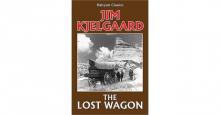 The Lost Wagon
The Lost Wagon The Spell of the White Sturgeon
The Spell of the White Sturgeon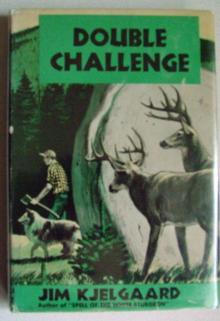 Double Challenge
Double Challenge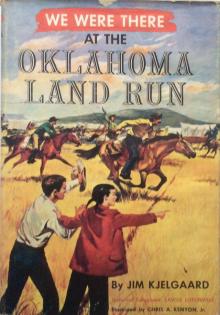 We Were There at the Oklahoma Land Run
We Were There at the Oklahoma Land Run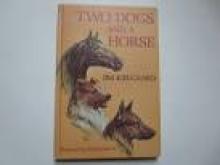 Two Dogs and a Horse
Two Dogs and a Horse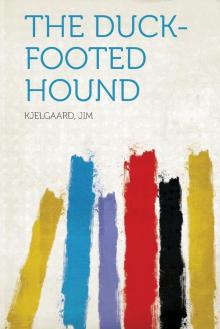 The Duck-footed Hound
The Duck-footed Hound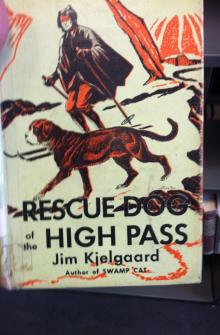 Rescue Dog of the High Pass
Rescue Dog of the High Pass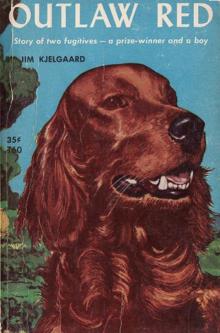 Outlaw Red
Outlaw Red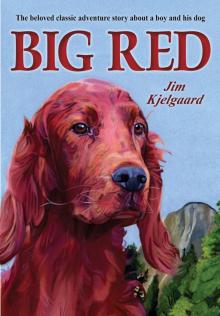 Big Red
Big Red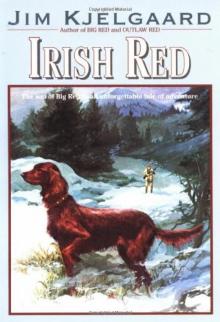 Irish Red
Irish Red